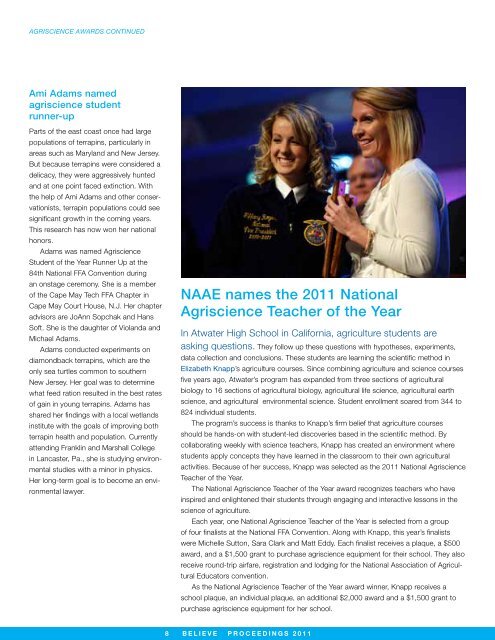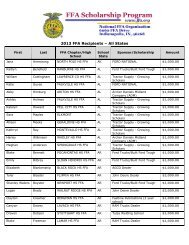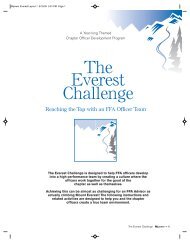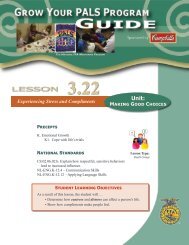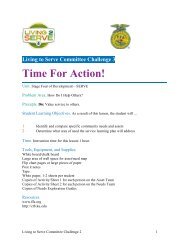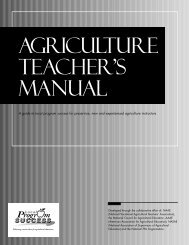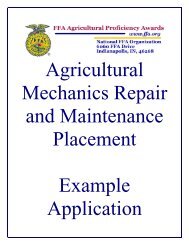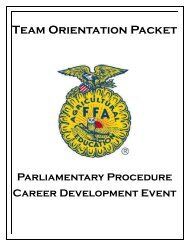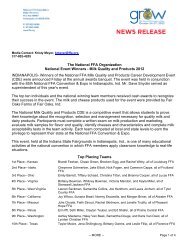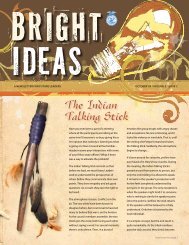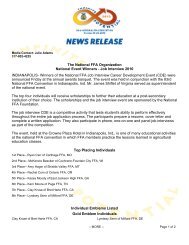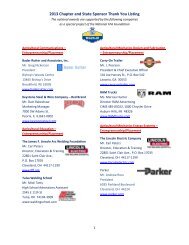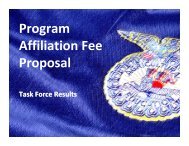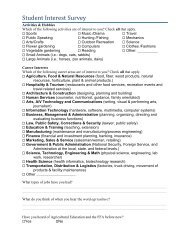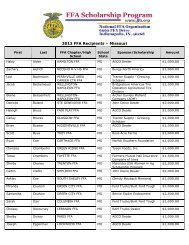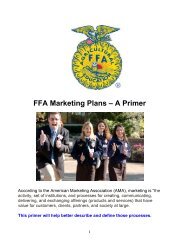2011 Proceedings - National FFA Organization
2011 Proceedings - National FFA Organization
2011 Proceedings - National FFA Organization
Create successful ePaper yourself
Turn your PDF publications into a flip-book with our unique Google optimized e-Paper software.
AgrisciEncE AwArds continuEd<br />
Ami Adams named<br />
agriscience student<br />
runner-up<br />
Parts of the east coast once had large<br />
populations of terrapins, particularly in<br />
areas such as Maryland and New Jersey.<br />
But because terrapins were considered a<br />
delicacy, they were aggressively hunted<br />
and at one point faced extinction. With<br />
the help of Ami Adams and other conservationists,<br />
terrapin populations could see<br />
significant growth in the coming years.<br />
This research has now won her national<br />
honors.<br />
Adams was named Agriscience<br />
Student of the Year Runner Up at the<br />
84th <strong>National</strong> <strong>FFA</strong> Convention during<br />
an onstage ceremony. She is a member<br />
of the Cape May Tech <strong>FFA</strong> Chapter in<br />
Cape May Court House, N.J. Her chapter<br />
advisors are JoAnn Sopchak and Hans<br />
Soft. She is the daughter of Violanda and<br />
Michael Adams.<br />
Adams conducted experiments on<br />
diamondback terrapins, which are the<br />
only sea turtles common to southern<br />
New Jersey. Her goal was to determine<br />
what feed ration resulted in the best rates<br />
of gain in young terrapins. Adams has<br />
shared her findings with a local wetlands<br />
institute with the goals of improving both<br />
terrapin health and population. Currently<br />
attending Franklin and Marshall College<br />
in Lancaster, Pa., she is studying environmental<br />
studies with a minor in physics.<br />
Her long-term goal is to become an environmental<br />
lawyer.<br />
NAAE names the <strong>2011</strong> <strong>National</strong><br />
Agriscience Teacher of the Year<br />
In Atwater High School in California, agriculture students are<br />
asking questions. They follow up these questions with hypotheses, experiments,<br />
data collection and conclusions. These students are learning the scientific method in<br />
elizabeth Knapp’s agriculture courses. Since combining agriculture and science courses<br />
five years ago, Atwater’s program has expanded from three sections of agricultural<br />
biology to 16 sections of agricultural biology, agricultural life science, agricultural earth<br />
science, and agricultural environmental science. Student enrollment soared from 344 to<br />
824 individual students.<br />
The program’s success is thanks to Knapp’s firm belief that agriculture courses<br />
should be hands-on with student-led discoveries based in the scientific method. By<br />
collaborating weekly with science teachers, Knapp has created an environment where<br />
students apply concepts they have learned in the classroom to their own agricultural<br />
activities. Because of her success, Knapp was selected as the <strong>2011</strong> <strong>National</strong> Agriscience<br />
Teacher of the Year.<br />
The <strong>National</strong> Agriscience Teacher of the Year award recognizes teachers who have<br />
inspired and enlightened their students through engaging and interactive lessons in the<br />
science of agriculture.<br />
Each year, one <strong>National</strong> Agriscience Teacher of the Year is selected from a group<br />
of four finalists at the <strong>National</strong> <strong>FFA</strong> Convention. Along with Knapp, this year’s finalists<br />
were Michelle Sutton, Sara Clark and Matt Eddy. Each finalist receives a plaque, a $500<br />
award, and a $1,500 grant to purchase agriscience equipment for their school. They also<br />
receive round-trip airfare, registration and lodging for the <strong>National</strong> Association of Agricultural<br />
Educators convention.<br />
As the <strong>National</strong> Agriscience Teacher of the Year award winner, Knapp receives a<br />
school plaque, an individual plaque, an additional $2,000 award and a $1,500 grant to<br />
purchase agriscience equipment for her school.<br />
8 Believe <strong>Proceedings</strong> <strong>2011</strong>


